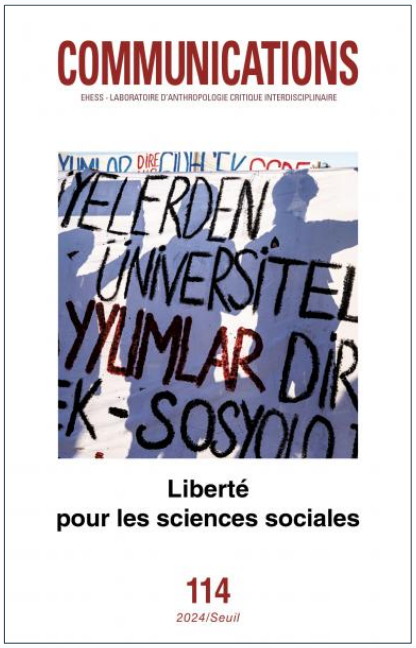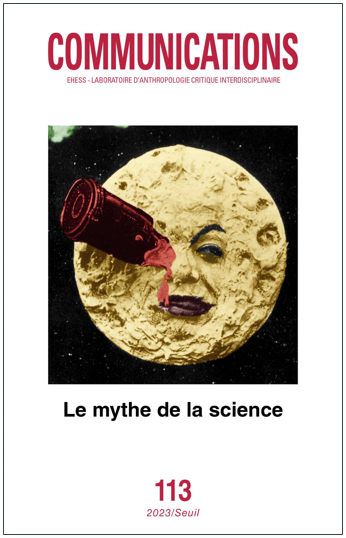About the journal
Presentation, Aims and Scope
A biannual thematic review, Communications was created in the autumn of 1961 by Georges Friedmann, Roland Barthes, and Edgar Morin. It has established itself as a reference in the field of the study of mass communications and semiological analyses in France, and has rapidly been acclaimed on the global scale. Since the 1980s, it has broadened its themes to include anthropo-social issues. It provides unpublished articles by both renowned scientists and junior researchers, opening up new avenues of research and promoting a high degree of transdisciplinarity. More than 1,500 contributions are now directly accessible, including, among many others, articles by Theodor W. Adorno, Roland Barthes, Umberto Eco, Moses Finley, Philippe Ariès, Tzvetan Todorov, Félix Guattari, Serge Moscovici, Mary Douglas, Clifford Geertz, Jacques Le Goff…
The journal Communications is published by the Laboratoire d’anthropologie critique interdisciplinaire (LACI), a research team within the LAP, Laboratoire d’anthropologie politique (Centre national de la recherche scientifique, CNRS / École des hautes études en sciences sociales, EHESS). It is edited and distributed by Editions du Seuil. The journal is supported by CNRS Humanities & Social Sciences and the National Book Centre (CNL).
All issues of Communications are built around a theme. They aim to make the disciplines communicate and to define new research directions.
Online Access
The issues of the journal Communications published since 1961 are now available online,
- in open access on Persée and on Cairn,
- except for the latest issues, wich are available in restricted access (on an article basis) on Cairn (embargo period with access to subscribers via Cairn platform : 1 year).
→ Follow this link for direct access to Communications issues available in print and online, indexed by year and theme.
Forthcoming
« Freedom for the Social Sciences »
Communications, Issue 114, May 2024
Edited by Nicole Lapierre, Évelyne Ribert
& Philippe Roussin
The human and social sciences have been the subject of disputes, rows, hostile behaviours and even attacks of a political nature in authoritarian regimes, “illiberal” democracies, and in liberal democracies alike. Such criticisms fall within the context of reforms aimed at integrating universities into a unified and competitive global knowledge market.
This issue of Communications takes stock of the threats targeting SHS in Europe, Africa, Asia and the United States. It also dwells on the epistemology of the SHS and finally ponders over and puts forward actions to secure academic freedom and institutional autonomy.
Just Published
« The myth of science »
Communications, Issue 113, November 2023
Edited by Antonella Romano
Les relations que les sociétés entretiennent avec la science s’inscrivent dans un ensemble de temporalités larges. Dans les espaces occidentaux, elles structurent leur histoire et ont pris un tour singulier à partir de la « révolution scientifique » à l’époque moderne.
Ce volume propose de discuter l’histoire des savoirs avec pour objectif d’interroger les multiples sens du terme « science », mobilisé si abondamment dans l’espace public et académique.
Les expressions des relations que nos sociétés entretiennent avec la science déterminent autant les réponses que les enjeux des choix économiques : quels sont les modèles de (dé)croissances associés à des choix technoscientifiques multiples ? Quel poids accorder à l’expertise scientifique dans le débat politique ? Quel rapport au travail ou à la consommation porte telle innovation scientifique ? Autant de questions que ce numéro aborde, avec un constat largement partagé : la non-neutralité de la science et le caractère constitutif de son rapport au politique.
The editorial board of Communications is committed to the social movement protesting against the pension reform and against the law the Pluriannual Research Programming Law (LPPR). Attached to the values of solidarity, social justice and knowledge sharing, we oppose the progressive destruction of public service and the commodification of knowledge. Advocating independent, fundamental and quality research, we reject the fragmentation and the precarity that the LPPR induces for researchers, professors, doctoral students, post-doctoral students and research support staff (ITA and BIATSS). We are staunchly attached to the essential role of tenure posts, both for researchers and ITA and BIATSS staff, to ensure open and quality research, as well as of permanent funding, crucial for allowing the publication of a social sciences journal. We reject that the elaboration of knowledge and its transmission may be subjected to instrumental or economic rationales and the imposition of managerial apparatuses, based on competition, without taking into account the specific operating modes of research. We strongly oppose the imposition of precarious positions onto junior researchers and research support staff, leading to the sacrificing a generation who, despite the originality and quality of their work, is likely to be doomed to evolving in an insecure future due to the drastic cuts in the academic positions on offer.
ISSN
— Communications (Paris. 1962), ISSN 0588-8018 (print)
— Communications (Paris), ISSN 2102-5924 (online)


